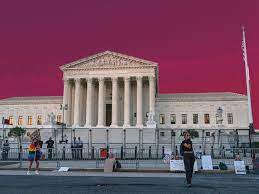Jennifer Rubin
Instant reaction to the US Supreme Court’s key affirmative action decision in Students for Fair Admissions, Inc. v. President and Fellows of Harvard College (joined with another case from the University of North Carolina) was predictable, hysterical and mostly wrong. Conservatives praised the end of affirmative action and absolute insistence on colorblind admissions; progressives bemoaned what they expected to be a dramatic decrease in diversity at top universities and colleges. Neither side was willing to admit there might be less here than meets the eye.
“We have permitted race-based admissions only within the confines of narrow restrictions. University programmes must comply with strict scrutiny, they may never use race as a stereotype or negative, and – at some point – they must end,” wrote Chief Justice John G. Roberts Jr. for the majority. “Respondents’ admissions systems – however well intentioned and implemented in good faith – fail each of these criteria. They must therefore be invalidated under the Equal Protection Clause of the Fourteenth Amendment.” Sounds like he means business, right? However, what he takes away with one hand he immediately gives back with the other: “At the same time, as all parties agree, nothing in this opinion should be construed as prohibiting universities from considering an applicant’s discussion of how race affected his or her life, be it through discrimination, inspiration, or otherwise.”
Perhaps realising the exception might swallow the rule (and usher in a flood of “Tell us something you had to overcome in your life” questions and clever college counsellors to help craft replies), Roberts hastened to add that colleges shouldn’t try to do indirectly what the court doesn’t want them to do directly. But once again, his “limitation” will not stop determined admissions officials and savvy students: A benefit to a student who overcame racial discrimination, for example, must be tied to that student’s courage and determination. Or a benefit to a student whose heritage or culture motivated him or her to assume a leadership role or attain a particular goal must be tied to that student’s unique ability to contribute to the university. In other words, the student must be treated based on his or her experiences as an individual – not on the basis of race. That is precisely what disadvantaged minority students will write – and have been writing – in a society still plagued with racism, that virtually all such applicants have faced disadvantages, stereotyping and outright discrimination simply by virtue of the way they appear to the White majority.
Only in Roberts’s make-believe world is there a group of minority students who never experienced a smidgen of discrimination (e.g., had less accumulated family wealth because of the legacy of housing discrimination, had to have “the talk” about police encounters, had teachers make assumptions about their abilities) and therefore would be unable to make the sort of case Roberts describes. Interestingly, in remarks following the opinion’s release, President Biden made this exact point. He stressed that colleges should be taking into consideration the “adversity” students have experienced, including economic disadvantage, where a student grew up and racial discrimination. He then read aloud the wide exception Roberts outlined. Certainly, the majority’s opinion will be frustrating to those who insist on intellectual consistency. Roberts’s majority opinion ridiculing the dissenters’ insistence on citing dissents and ignoring majority opinion language in earlier cases restricting but not eliminating affirmative action stands as another example of first-class hypocrisy.
In Dobbs v. Jackson Women’s Health Organisation, the right-wing majority ignored 5o years of precedent to revive dissent arguments against women’s constitutional right to bodily autonomy. (And, as in Dobbs, the court here overrode precedent without applying the normal test to ignore stare decisis.)
Moreover, Roberts and his right-wing allies ironically chose to ignore the best originalist analysis of the 14th Amendment. “I don’t think that the historical record establishes that the founders believed that race neutrality or race blindness was required,” Justice Ketanji Brown Jackson said at oral argument in Merrill v. Mulligan.
“That’s the point of that act, to make sure that the other citizens, the Black citizens, would have the same [rights] as the white citizens.” However, just because Roberts’s decision is inaccurate and contradictory does not mean it will be devastating in practice. In their haste to both ignore the history of the 14th Amendment and deny the extensive legacy of racism in nearly every aspect of life (which Justices Sonia Sotomayor and Jackson traced in exquisite detail in her dissent, which was joined by Sotomayor and Justice Elena Kagan), the majority left wide open an easy workaround to their “let-them-eat-cake obliviousness.” “The admissions rubrics they have constructed now recognise that an individual’s ‘merit’ – his ability to succeed in an institute of higher learning and ultimately contribute something to our society – cannot be fully determined without understanding that individual in full,” Jackson wrote. Put simply, as long as you allow students to tell their personal story of racism, race will get considered in the admissions process – to the chagrin of the right-wing justices and politicians who cheer this Pyrrhic victory.
The Washington Post







